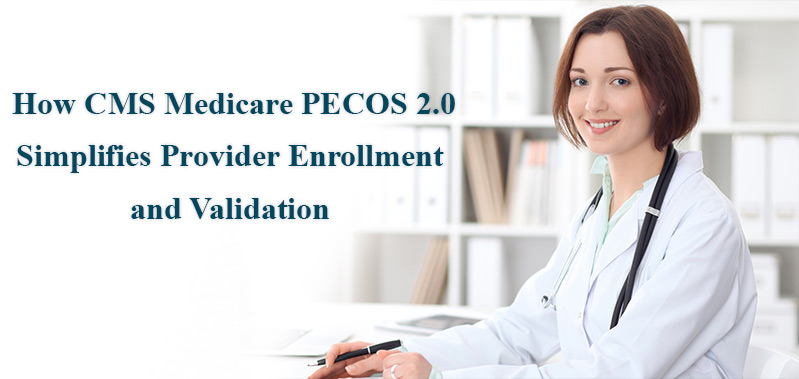
How CMS Medicare PECOS 2.0 Simplifies Provider Enrollment and Validation
The Centers for Medicare & Medicaid Services (CMS) has introduced an upgraded version of its Provider, Enrollment, Chain, and Ownership System (PECOS), known as PECOS 2.0. This enhancement is designed to streamline provider enrollment and validation processes, making it more efficient for healthcare providers and administrators. For years, PECOS has been the standard system for enrolling healthcare providers in Medicare. However, with the complexities and demands of modern healthcare, CMS recognized the need for a more user-friendly and robust platform.
This article explores how CMS Medicare PECOS 2.0 simplifies provider enrollment and validation and why these changes matter for healthcare providers.
What is PECOS 2.0?
CMS Medicare PECOS 2.0 is an upgraded version of the original PECOS platform, developed to address inefficiencies and improve the overall experience for users. The new system builds upon the foundation of the original PECOS by leveraging modern technology to enhance functionality, provide a more intuitive user interface, and streamline the data validation process.
At its core, PECOS 2.0 is designed to make provider enrollment faster and more secure. It also aims to reduce administrative burdens, allowing providers to focus more on delivering care rather than navigating bureaucratic hurdles.
Key Features of PECOS 2.0
-
Enhanced User Experience
One of the most significant upgrades in CMS Medicare PECOS 2.0 is its redesigned user interface. The previous system was often criticized for being difficult to navigate, requiring providers to sift through complex menus and forms. PECOS 2.0 simplifies this by offering a more intuitive design, making it easier for providers to complete their enrollment or make updates to their profiles. Step-by-step instructions and clear prompts guide users through the entire process, reducing the potential for errors. -
Streamlined Provider Enrollment
PECOS 2.0 simplifies the enrollment process by reducing the number of forms and redundant data entry. Providers can now upload documents directly into the system, and the new platform automatically verifies much of the information. This not only speeds up the enrollment process but also reduces the likelihood of delays caused by missing or incorrect information. The system also integrates with other CMS databases, ensuring that data validation happens in real time. -
Improved Data Validation and Accuracy
Ensuring the accuracy of provider information is crucial for CMS, as inaccurate data can lead to claims processing issues and delayed reimbursements. CMS Medicare PECOS 2.0 includes enhanced data validation mechanisms that help ensure the information provided by healthcare providers is correct. By cross-referencing data with other CMS systems, PECOS 2.0 reduces the risk of errors during the enrollment process. This improvement greatly benefits healthcare organizations by helping them avoid potential enrollment issues that could lead to interruptions in care delivery or payment delays. -
Real-Time Status Tracking
Another key feature of PECOS 2.0 is the ability for providers to track the status of their enrollment applications in real time. This feature addresses a common frustration among healthcare providers who previously had to wait without clear visibility into their application’s progress. Now, with a simple log-in, providers can see exactly where their application is in the review process, making it easier to plan accordingly and anticipate any additional steps they may need to take. -
Centralized Enrollment for Group Practices
PECOS 2.0 also introduces a centralized enrollment system for group practices, enabling them to manage the enrollment of all practitioners within their network from a single platform. This feature is especially beneficial for larger healthcare organizations, as it allows administrators to oversee multiple provider enrollments in one location, making it easier to manage updates, renewals, and compliance checks for the entire group. -
Automated Renewal Reminders
In an effort to reduce the administrative burden on healthcare providers, PECOS 2.0 now includes automated reminders for renewals and updates. Providers will receive notifications when it’s time to update their enrollment information or renew their Medicare participation. This feature helps providers stay compliant with CMS requirements, reducing the risk of disruptions in their Medicare billing or service delivery.
Benefits of PECOS 2.0 for Healthcare Providers
-
Time and Cost Efficiency
The simplified enrollment process in PECOS 2.0 saves providers significant time and effort. Fewer steps and automated data validation mean fewer administrative tasks and less back-and-forth with CMS, which can translate into lower administrative costs. By reducing delays in enrollment, providers can start or continue their Medicare participation more quickly, ensuring they can serve patients and receive reimbursements without interruption. -
Reduced Risk of Errors
The new platform’s improved data validation capabilities reduce the chances of errors that could lead to delays in the enrollment process. This not only enhances the accuracy of provider data but also minimizes the risk of billing issues or compliance violations. -
Improved Compliance
With automated reminders for renewals and an integrated validation system, PECOS 2.0 makes it easier for providers to stay compliant with CMS requirements. The platform’s centralized management tools also allow larger healthcare organizations to oversee compliance across all providers, reducing the risk of oversight. -
Better Transparency
The real-time status tracking feature of CMS Medicare PECOS 2.0 offers providers greater transparency throughout the enrollment process. This means providers can quickly resolve any issues and avoid the uncertainty that often comes with waiting for updates from CMS.
Conclusion
CMS Medicare PECOS 2.0 represents a significant step forward in simplifying the provider enrollment and validation process. By enhancing the user experience, streamlining data entry, and improving compliance and data accuracy, PECOS 2.0 reduces the administrative burden on healthcare providers while ensuring they can focus on delivering care to Medicare patients. For providers, embracing PECOS 2.0 means improved efficiency, fewer errors, and greater transparency in their interactions with CMS.




